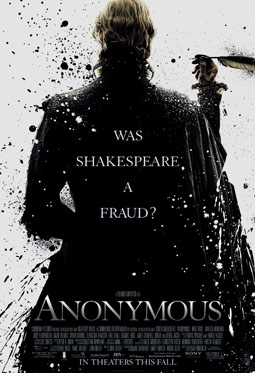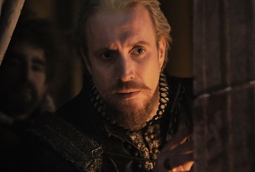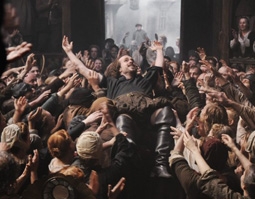



Anonymous is a film that tackles a universally recognized and accepted paradigm and calls it false, leading to some measure of extreme reaction. Anonymous proposes the idea that William Shakespeare was a fraud and the classic literary works that we all know, and accept, as his were actually written by Edward de Vere, the Earl of Oxford.

This bold premise may have influence over people’s perceptions of the film, itself. When I screened Anonymous, I went in with the mindset that this film is a work of fiction and to approach my opinion as such. I will not go into the concepts like historical inaccuracy or say that the plotline and presentation of Anonymous is bad because of what the story implies; rather the film Anonymous challenged the idea of what is known to be true and should be judged for its entertainment value.

Anonymous is framed by a New York stage performance of the same title narrated by veteran actor, Derek Jacobi. From the stage show, we go into the “real” story, set in Elizabethan England. The main character, as mentioned above, is Edward de Vere, the Earl of Oxford (played by Rhys Ifans). The backbone of the plot in the film Anonymous is de Vere’s life story. Edward shows his gift for writing early on while performing a play of his own work titled, “A Midsummer Night’s Dream,” for Queen Elizabeth. As he grows older, Edward is raised by the Cecils and forbidden to write any more plays or poems due to the family’s religious beliefs. Undeterred, Edward continues to write, and seeing the power of words he comes to realize that there is an inspiration for political movement in his work. He summons a writer named Ben Jonson (played by Sebastian Armesto) to serve as a mouthpiece for his works and offers him the opportunity to take credit for the works. Needless to say, Jonson refuses, but an ambitious young actor named William Shakespeare (Rafe Spall) takes the credit and begins his journey towards being the iconic literary figure we have come to know today.

With a web of political intrigue, including both succession to the Queen’s throne and a potential rebellion, as a backdrop for the performance of Shakespeare’s (de Vere’s) plays, Anonymous has a lot going on simultaneously. This can make the film a bit difficult to follow at times, especially with the constant scene jumps from past to present time, to other action going on in the present.

Director Roland Emmerich, who is better known for blockbuster action fare like Independence Day, The Day After Tomorrow, and 2012 is admirably breaking the expectation that people have of his work with the film, Anonymous. But without some mega-disaster or CGI-enhanced chaos unfolding (though there is a gorgeous digital presentation of Elizabethan London), the story feels very up and down.
Regarding the flow of Anonymous, at times the movie moves at a crisp rate with intrigue unfolding during interaction between Edward de Vere and Ben Jonson. At other times, Anonymous slows to a crawl, especially when trying to expand on the political maneuverings of the Cecils and the Queen.
That said, the overall plot in Anonymous is an interesting and unique concept, even if Emmerich did bite off more than he could chew. As with any decent film, Anonymous does boast some solid performances, specifically Rhys Ifans (an actor better known to mainstream audiences in sillier roles) as Edward de Vere. The character of Edward de Vere is strongly convinced of the power of his own work and he is willing to sacrifice glory just for the world to hear his stories. Ifans is able to convince the audience of this and inhabits the role of de Vere.
Another standout is Sebastian Armesto as Ben Jonson, which makes the scenes between the two the best part of Anonymous. Finally, actress Vanessa Redgrave rounds out the notable members of the cast as the older Queen Elizabeth I. Her character’s part is the thread that links the various plots in Anonymous and is one of the more important roles. Redgrave’s Queen is regal, yet able to subtly portray how troubled she is by the events unfolding around her.
Overall, Anonymous is the kind of film that the world could use more of. Outlandish claims about history aside, the story dared to be different, something we rarely see coming out of Hollywood these days.
Anonymous challenges convention, offering a different perspective. Director Roland Emmerich is able to deliver an inspired, albeit inconsistently paced vision that should find an audience.
Anonymous
Rated PG-13. Runtime 130 min. Theatrical release 10/28/2011.
PR.com Rating: C+
